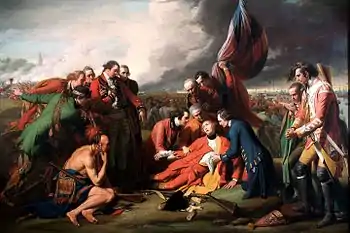1836 in Canada
| Years in Canada: | 1833 1834 1835 1836 1837 1838 1839 |
| Centuries: | 18th century · 19th century · 20th century |
| Decades: | 1800s 1810s 1820s 1830s 1840s 1850s 1860s |
| Years: | 1833 1834 1835 1836 1837 1838 1839 |
| Part of a series on the |
| History of Canada |
|---|
| Timeline |
| Historically significant |
| Topics |
| By Provinces and Territories |
| See also |
|
Events from the year 1836 in Canada.
Incumbents
Federal government
- Parliament of Lower Canada: 15th
- Parliament of Upper Canada: 12th (until March 8), 13th (starting November 8)
Governors
Events
- Opening of Canada's first railway line, from St. Johns, Quebec, to La Prairie, Quebec.
- January – Book by Maria Monk claims that she was sexually exploited in a Canadian convent
- February – Lord Aberdeen approves of Lord Aylmer's conduct. The Governor declares that, in filling offices, he has more considered qualifications than nationality; that 80, of 142, places of emolument, and 295 of 580 unsalaried offices, are filled by Frenchmen.
- Lieutenant-Governor Francis Bond Head dissolves parliament and calls a new election.
- July 4 – First issue of The Constitution published.
- August – The Commission reaches Quebec, and consists of Lord Gosford, Sir Charles Grey and Sir James Gipps. A congratulatory address is presented to them at Quebec.
- October – Lord Gosford informs Parliament of the purposes of the Commission and of the intended changes. He exhorts members to be conciliatory, saying: "Consider the blessings you might enjoy, but for your dissensions. Offspring, as you are, of the two foremost nations of the earth, you hold a vast and beautiful country, having a fertile soil, with a healthful climate, while the noblest river in the world makes seaports of your remote havens."
- November
- Commissioner Grey embarks for England.
- 1836 Newfoundland general election
- Mr. Papineau's following is 40 to 27, of the House. Mr. Papineau declares "Our task is not light, indeed, for we are called on to defend the rights of all British Colonial dependencies, as well as that we inhabit. The same evil genius, whose workings drove provincials of the neighboring States, unwittingly into the paths of a righteous and glorious resistance, presides over our affairs also. ...These Commissioners' instructions imply refusal, of those who prepared them, to listen heedfully to any representation of the many grievances either Canada has to complain of."
- Eastern Townships, members desert Mr. Papineau.
- Lord Gosford disappointedly declares "I will not predict all the consequences which may result from the factious opposition."
- In Upper Canada the 92 resolutions are expunged from the journals.
Births
- January 20 – Robert Beaven, businessman, politician and 6th Premier of British Columbia (died 1920)
- March 28 – Robert Thorburn, merchant, politician and Premier of Newfoundland (died 1906)
- May 24 – William Mortimer Clark, lawyer, politician and Lieutenant Governor of Ontario (died 1915)
- August 24 – Agnes Macdonald, 1st Baroness Macdonald of Earnscliffe, second wife of John A. Macdonald, first Prime Minister of Canada (died 1920)
- September 25 – James Macleod, militia officer, lawyer, police officer, magistrate, judge and politician (died 1894)
- October 7 – Henri Elzéar Taschereau, jurist and 4th Chief Justice of Canada (died 1911)
- December 4 – Charles Augustus Semlin, politician and Premier of British Columbia (died 1927)
- December 11 – George Gerald King, politician (died 1928)
Full date unknown
- Robert Boston, politician (died 1922)
Deaths
This article is issued from Wikipedia. The text is licensed under Creative Commons - Attribution - Sharealike. Additional terms may apply for the media files.

